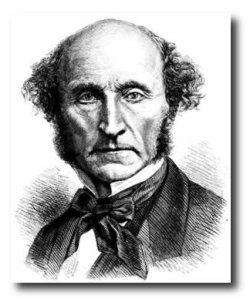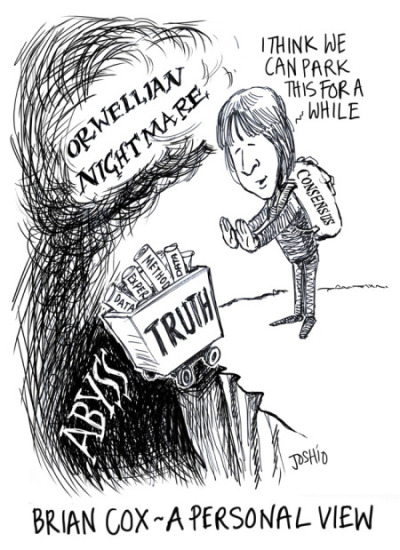 Bishop Hill
Bishop Hill The Orwellian solution
 Dec 3, 2010
Dec 3, 2010  BBC
BBC  Climate: other
Climate: other  Media
Media As readers know, I have been keeping a close eye on the BBC's review of science coverage, to which TonyN and I have made a submission.
Science coverage on the television was also the subject of a recent lecture at the Royal Television Society (H/T Martyn in the comments) and it's hard to believe that the timing is coincidental.
 The speaker was Professor Brian Cox, who, for viewers outside the UK is something of a rising star in the world of TV science. His day job is in physics - he plies his trade at CERN - and if he has something of a retired pop star about him, this is because earlier in life he was the keyboard player in a chart-topping band.
The speaker was Professor Brian Cox, who, for viewers outside the UK is something of a rising star in the world of TV science. His day job is in physics - he plies his trade at CERN - and if he has something of a retired pop star about him, this is because earlier in life he was the keyboard player in a chart-topping band.
Cox is an engaging speaker and his lecture is well worth a look although I think it's fair to say that his thinking ends up in some pretty disturbing places.
 The thrust of the lecture is that television programmers should adopt a new approach to scientific controversies. Cox's view steers very close to what emerged from the notorious BBC seminar, where NGO activists got to influence BBC output on climate change. He first cites The Great Global Warming Swindle, describing its factual content as "total bollocks", but going on to say that it still deserved to be aired. The conclusion he reaches is that counter-consensus programmes have a valuable place, and he cites approvingly John Stuart Mill's famous words
The thrust of the lecture is that television programmers should adopt a new approach to scientific controversies. Cox's view steers very close to what emerged from the notorious BBC seminar, where NGO activists got to influence BBC output on climate change. He first cites The Great Global Warming Swindle, describing its factual content as "total bollocks", but going on to say that it still deserved to be aired. The conclusion he reaches is that counter-consensus programmes have a valuable place, and he cites approvingly John Stuart Mill's famous words
We can never be sure that the opinion we are endeavoring to stifle is a false opinion; and even if we were sure, stifling it would be an evil still.
But despite this, Cox is not happy with the status quo, and feels that something has to be done. His solution is that where a programme conflicts with the "scientific consensus", it should be treated as a "polemic" rather than a "documentary" and needs to be flagged as such, perhaps by calling it "a personal view" or otherwise labelling it in some way. This appears to me to be tantamount to forcing some programme makers to declare their ideas as "wrong", and this angle is not lost on Cox either, who wonders out loud if the position his thought process has taken him to is "authoritarian" - he mentions George Orwell too. Rather disturbingly he says he doesn't know the answer to this question and then, rather than resolve the dilemma, he drops the subject entirely.
Of course, even if we accept Cox's rather unscientific idea of a scientific consensus, there is still the question of who gets to decide what is consensus and what is polemic. The next programme he cites is Iain Stewart's Climate Wars, the three-part hit piece on climate sceptics that aired back in 2008. In Cox's view this is the epitome of what a well-balanced programme should be, with the presenter's view allegedly clearly distinguished from its presentation of the scientific consensus. Of course, as most readers here know, the problem with Climate Wars was that it was a highly political piece, with a well-known green activist as its scientific adviser, and of course famously misrepresenting the scientific consensus, as when presenter Iain Stewart climbed a bristlecone pine and extolled its virtues as a temperature proxy when there was a clear scientific consensus at the time that bristlecones were unsuitable for temperature reconstructions.
(As an aside, one of the members of the BBC Trust once told me that the BBC did allow sceptics to put forward their views, and cited Climate Wars as an example!)
Cox doesn't consider the issue of who defines what is consensus and what is polemic, and it seems clear to me that he hasn't thought the issues through properly. He can see that he is standing at the abyss, but doesn't want to turn away from it.
The liberal (in the old sense of the word) solution is, of course, a marketplace of ideas, in which people can put forward their cases as best they can. What Cox has to recognise is that his tiptoeing towards an Orwellian solution is only necessary because media ownership is so concentrated in the UK and because the BBC so dominates the marketplace. He doesn't need a truth commission to apply the "documentary" stamp to approved programmes. He needs the BBC to be broken up.
In the meantime though, there is the BBC's review of science, who will no doubt be aware of what Cox is saying. It will be interesting to see if the review adopts Cox's favoured approach, the one that makes him think of George Orwell.




Reader Comments (57)
'This appears to me to be tantamount to forcing some programme makers to declare their ideas as "wrong"'
Not necessarily, my lord Bishop. The ground-breaking Civilisation was sub-titled "A Personal View by Kenneth Clark", just as The Ascent of Man was "A Personal View by J Bronowski". In the same vein, Simon Schama's block-buster was called "A History of Britain", not "The History...", indicating that it was only one of many possible interpretations.
It might be argued that this labelling falls under the category of arguing from authority, but at least it indicates exactly who the authority is - an actual person - rather than a shadowy (and often shabby) cabal the BBC and other MSM too often call upon. It is up to the viewer to take on board the views expressed in these programmes, depending on their opinion of Clark, Bronowski, Schama etc.
Presumably Cox would have incarcerated Galileo because the consensus was that Galileo was wrong.
Science is not about consensus. It is about verifying an hypothesus by experimental means.
Maybe Cox is making so much money from the BBC that he is willing to sell his scientific integrity.
He won't be the first.
@DougieJ - Dr. Ben 'Bad Science' Goldacre is not all he makes out to be, and it does not surprise me that he is a paid up member of the polycatastrophists. It is little known that the award he received for best science article (on the subject of MMR) was actually sponsored by GlaxoSmithKline. He nor the Guardian have never fessed up to this, which is a breach of journalistic guidelines at the very least. If you do a little research you will find that there were/are some very serious safety concerns with MMR (and other vaccines). Wakefield may have made some mistakes, but his research findings have been validated by others. That said his hypothesis is just one of many which raise important questions over the safety of mass vaccinations policy, e.g. use of thimerisol (50% mercury) in early childhood vaccinations (only banned in 2004 but still in the flu vaccines which they are now pushing on children and pregnant mums) is unrelated to MMR and Wakefield's work. (although Hg from DTP shots could have acted as an immune system suppressant in some kids, making it easier for MMR to pull the trigger). Look at the similarities in symptoms between acquired autism and mercury poisoning - and then google for the minutes of the CDC's Simpsonwood meeting in 2000 (look for the minutes, not the wikipedia page). The increasing use of aluminium as an adjuvant is also of concern. There are actually very strong parallels here with climate science - no genuine double-blind studies are ever conducted, observational evidence (adverse reactions) are ignored/dismissed, studies are usually epidemiological (paper based and involve very dubious use of statistics), any doctors or researchers who question the orthodoxy lose their jobs, funding and careers. In short the funding and peer review process has been corrupted by vested and corporate and political interests.
@lapogus: interesting points. Not sure I can go along with them though. One could of course make the opposite connection - that Wakefield and indeed anyone who claims a link between MMR and autism is making the classic 'correlation = causation' error based on extremely limited / compromised data. This is of course endemic within climate science.
As far as wider new age beliefs of the type that Goldacre attacks are concerned - I've seen AGW alarmists try to draw parallels with climate sceptics (in the sense that there is established, peer reviewed science on the one hand and 'alternative' science on the other), but you have to ask yourself, who is more likely to hold new-age beliefs - a Gaia worshipping member of Greenpeace or a hard-headed, reasonable, probably right of centre sceptic (both stereotypes admittedly)?
When did the Church of Climatology begin accepting even moderately skilled physicists as anything but "out of their field of expertise" Gaia haters? Will professor Richard Lindzen's credibility with the AGW faithful suddenly skyrocket? If Professor Cox is given a podium because of his having held a clipboard at CERN, is there a chance they'll allow Richard to edit the AGW bible or at least do the disclaimer? Ah a new day for science dawns and Al Gore can once again go back to giving his little section of Gaia another face lift with a landscaping crew and a D-9 Cat... the old girl never looked so good!
Cox is a semi photogenic, annoying idiot with a phony accent and phony enthusiasm. I can't stand watching him. Plastic man.
Dougie, sorry for the delayed response. I haven't closely followed the vaccine debate much in recent months, but just came across this article by John Stone which is a good summary of the shenanigans going on between Goldacre (Senior and Junior), the Guardian, the Science Media Centre, (Fiona Fox), the Davis brothers, Sir Crispin and Sir Nigel, Richard Horton, and Evan Harris, to discredit any one who questioned the safety of MMR. Talk about the IPPC lead authors being a cabal!
Read it all here - http://www.ageofautism.com/2010/08/whats-behind-ben-goldacre-.html
For some perspective on the science it is always worth reading a key conclusion of the highly respected Cochrane Review into MMR safety studies: “The design and reporting of safety outcomes in MMR vaccine studies, both pre- and post-marketing is largely inadequate”. (And that's what they put in writing, iirc off the record the language they used was a lot more colourful).